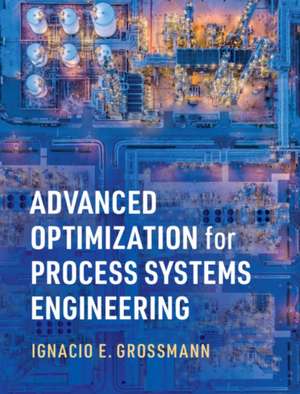Advanced Optimization for Process Systems Engineering: Cambridge Series in Chemical Engineering
Autor Ignacio E. Grossmannen Limba Engleză Hardback – 24 mar 2021
Din seria Cambridge Series in Chemical Engineering
-
 Preț: 387.70 lei
Preț: 387.70 lei - 11%
 Preț: 690.32 lei
Preț: 690.32 lei - 8%
 Preț: 524.87 lei
Preț: 524.87 lei - 14%
 Preț: 733.39 lei
Preț: 733.39 lei - 9%
 Preț: 827.95 lei
Preț: 827.95 lei - 23%
 Preț: 919.60 lei
Preț: 919.60 lei - 9%
 Preț: 673.64 lei
Preț: 673.64 lei - 8%
 Preț: 475.80 lei
Preț: 475.80 lei -
 Preț: 468.66 lei
Preț: 468.66 lei -
 Preț: 456.20 lei
Preț: 456.20 lei - 19%
 Preț: 508.19 lei
Preț: 508.19 lei - 11%
 Preț: 652.06 lei
Preț: 652.06 lei -
 Preț: 372.97 lei
Preț: 372.97 lei - 11%
 Preț: 504.78 lei
Preț: 504.78 lei - 11%
 Preț: 608.30 lei
Preț: 608.30 lei - 14%
 Preț: 714.79 lei
Preț: 714.79 lei - 11%
 Preț: 597.75 lei
Preț: 597.75 lei - 9%
 Preț: 939.13 lei
Preț: 939.13 lei - 14%
 Preț: 967.06 lei
Preț: 967.06 lei - 14%
 Preț: 721.78 lei
Preț: 721.78 lei - 14%
 Preț: 762.45 lei
Preț: 762.45 lei - 11%
 Preț: 584.57 lei
Preț: 584.57 lei - 11%
 Preț: 654.56 lei
Preț: 654.56 lei - 14%
 Preț: 743.23 lei
Preț: 743.23 lei - 11%
 Preț: 519.73 lei
Preț: 519.73 lei - 14%
 Preț: 1154.13 lei
Preț: 1154.13 lei - 11%
 Preț: 507.17 lei
Preț: 507.17 lei - 11%
 Preț: 644.23 lei
Preț: 644.23 lei - 11%
 Preț: 671.37 lei
Preț: 671.37 lei - 14%
 Preț: 1015.72 lei
Preț: 1015.72 lei - 11%
 Preț: 567.49 lei
Preț: 567.49 lei - 14%
 Preț: 718.06 lei
Preț: 718.06 lei - 14%
 Preț: 970.76 lei
Preț: 970.76 lei - 11%
 Preț: 541.22 lei
Preț: 541.22 lei - 11%
 Preț: 478.37 lei
Preț: 478.37 lei -
 Preț: 397.91 lei
Preț: 397.91 lei - 14%
 Preț: 781.82 lei
Preț: 781.82 lei - 15%
 Preț: 558.29 lei
Preț: 558.29 lei - 23%
 Preț: 731.86 lei
Preț: 731.86 lei - 15%
 Preț: 719.01 lei
Preț: 719.01 lei - 23%
 Preț: 832.48 lei
Preț: 832.48 lei
Preț: 530.04 lei
Preț vechi: 576.14 lei
-8% Nou
101.42€ • 105.89$ • 83.94£
Carte disponibilă
Livrare economică 14-28 martie
Livrare express 27 februarie-05 martie pentru 34.07 lei
Specificații
ISBN-10: 1108831656
Pagini: 102
Dimensiuni: 194 x 252 x 14 mm
Greutate: 0.54 kg
Editura: Cambridge University Press
Colecția Cambridge University Press
Seria Cambridge Series in Chemical Engineering
Locul publicării:New York, United States
Cuprins
Preface; 1. Optimization in process systems engineering; 2. Solving nonlinear equations; 3. Basic theoretical concepts in optimization; 4. Nonlinear programming algorithms; 5. Linear programming; 6. Mixed-integer programming models; 7. Systematic modeling of constraints with logic; 8. Mixed-integer linear programming; 9 Mixed-integer nonlinear programming; 10. Generalized disjunctive programming; 11. Constraint programming; 12. Nonconvex optimization; 13. Lagrangean decomposition; 14. Stochastic programming; 15. Flexibility analysis; Appendix A. Modeling systems and optimization software; Appendix B. Optimization models for process systems engineering; References; Index.
Recenzii
'From the globally recognized leading authority in the field of process systems engineering, this long-awaited book will definitely become the standard reference for anyone interested in optimization. It is very well thought and written, with excellent presentation of the material. The theory is described in a very effective, rigorous, and clear way, with appropriate explanations and examples used throughout, covering traditional topics such as linear and nonlinear optimization concepts and mixed-integer linear programming, along with more advanced topics, such as disjunctive programming, global optimization, and stochastic programming. A real gem and a must read!' Stratos Pistikopoulos, Texas A & M University
Descriere
Based on the author's forty years of teaching experience, this unique textbook covers both basic and advanced concepts of optimization theory and methods for process systems engineers. Topics covered include continuous, discrete and logic optimization (linear, nonlinear, mixed-integer and generalized disjunctive programming), optimization under uncertainty (stochastic programming and flexibility analysis), and decomposition techniques (Lagrangean and Benders decomposition). Assuming only a basic background in calculus and linear algebra, it enables easy understanding of mathematical reasoning, and numerous examples throughout illustrate key concepts and algorithms. End-of-chapter exercises involving theoretical derivations and small numerical problems, as well as in modeling systems like GAMS, enhance understanding and help put knowledge into practice. Accompanied by two appendices containing web links to modeling systems and models related to applications in PSE, this is an essential text for single-semester, graduate courses in process systems engineering in departments of chemical engineering.
